Thursday, February 28, 2008
Commentary: Clinton at risk of losing Latino vote
SAN DIEGO, California (CNN) -- If Hillary Clinton loses the Democratic nomination for president, she might be able to trace her troubles back to when she lost her grip on the Latino vote.
![art.navarette.wapo[1].jpg](http://i.l.cnn.net/cnn/2008/POLITICS/02/27/navarette.opinion/art.navarette.wapo%5B1%5D.jpg)
Ruben Navarrette Jr.: Sen. Barack Obama belatedly but quickly found the importance of courting Latinos.
Bill Clinton called it. The ex-president may have doomed his wife's candidacy with his meddling but he was right about one thing: Several weeks ago, he told Spanish-language radio host Eddie "El Piolin" Sotelo that Latinos would "determine the nominee of the Democratic Party and the next president of the United States."
So they might. Just not in the way that the former president imagined.
When he made his prediction, Hillary Clinton was leading Barack Obama among Latinos by a 2-1 margin. No mas.
A recent Gallup survey found Obama in a slight, but not statistically significant, lead over Clinton among Latinos. Obama-mania has gone multicultural. And it's about time.
The Illinois senator spent so much of the early part of the campaign proving he could appeal to both blacks and whites that he never stopped to ask: "What can brown do for me?" As a result, Obama fumbled in the Nevada caucus.
But he recovered in time to fare better than expected on Super Tuesday.
He won the Latino vote in Illinois and Colorado and stayed competitive in New Mexico and Arizona, even while getting wiped out in California, New York, and New Jersey.
Then he won the Latino vote in Virginia. Now, with the all-important Texas primary approaching on March 4th, Obama is trailing Clinton with Latinos in the Lone Star state but he's making inroads there.
Don't Miss
There is even a "Viva Obama" video featuring a group of mariachis singing the candidate's praises. Obama's recent success with Latinos is evidence that Hillary's support in that community is a mile wide and an inch thick.
That's understandable. Neither Bill nor Hillary Clinton has done much for Latinos in their public careers, and most of the support they enjoy from that community comes from brand loyalty -- the same thing that keeps Latinos coming back to one kind of laundry detergent keeps them coming back to the Clinton name.
In this election, Hillary has tarnished the brand with mistakes. During a debate in Los Angeles, she answered a question by pitting undocumented Latino immigrants against African-Americans.
She blamed jobs losses on "employers who exploit undocumented workers and drive down wages." And she mentioned an African-American who told her that he used to have construction jobs but now "the only people who get them anymore are people who are here without documentation."
Faced with the same question, Obama pointed out that African-Americans had high unemployment rates long "before the latest round of immigrants showed up" and cautioned against using the immigration issue to divide Americans.
Obama also insisted -- to rousing applause -- that blaming immigrants for unemployment among blacks amounts to "scapegoating" and said he wouldn't tolerate it. Score one for Obama. You can almost hear the mariachis warming up.
Too much whining ruined whatever points Hillary Clinton scored
You don't have to love Hillary Clinton to feel her pain. By the end of Tuesday night's debate, she knew she had failed to change the dynamics of a race slipping away from her. The deflated look on her face telegraphed acceptance, even resignation.
But any sympathy is tempered by the fact she has only herself to blame. Her uneven performance, punctuated by one of the strangest complaints I have ever seen in a presidential debate, likely dashed her last hopes of victory. The self-pity behind the complaint was shocking and unappealing.
She started by being feisty - to a fault. The first 14 minutes were devoted to health care, her signature issue. Yet she was on the defensive and kept interrupting the moderators because Barack Obama skillfully focused on the requirement in her plan that every American purchase health care, whether they want it or not. It is a fair attack because Clinton has never explained how she would enforce that requirement or say what the penalties would be; she didn't last night, either.
Clearly frustrated by that rocky start, she began her answer to the second question, on NAFTA, with the complaint. "Well, can I just point out that in the last several debates, I seem to get the first question all the time? And I don't mind," she said, clearly minding.
Then she made the mistake worse with a foolish rehearsed line: "And if anybody saw 'Saturday Night Live,' you know, maybe we should ask Barack if he's comfortable and needs another pillow."
Wow. Woe is her. What a blunder. This is political malpractice of the first order.
This bomb was far worse than her "change you can Xerox" line of last week. This was a petulant whine. There was rustling in the audience, but mostly there was an awkward silence of the kind you notice when someone has said something weird or inappropriate. Creating discomfort in voters over your pain is not a traditional formula for victory.
Obviously, Clinton believes the press is biased in favor of Obama. It's a charge her team has made frequently. Yet her raising it with a victim's tone came off as a plea for sympathy - not an endearing quality in someone who wants to be President. A President is supposed to feel sympathy for the people, not the other way around.
There was one other noteworthy exchange. Asked about the endorsement he got from Louis Farrakhan, the Nation of Islam leader who makes frequent anti-Semitic statements, Obama said he had renounced those remarks. He went on to say he was a staunch friend of Israel and cited its "special relationship" with America. He concluded with the touching note that many American Jews were instrumental in the civil rights movement, and that, as President, he hoped to restore what he called a "frayed" bond.
No complaints there. Or here.
Obama holds his lead
Debating to a draw suits Barack Obama

IT HARDLY seems possible, but there have been no fewer than 20 televised debates in the long struggle to settle the Democratic nomination. The latest was in Cleveland, Ohio, on Tuesday February 26th. For Hillary Clinton it represented a final chance to unsettle Barack Obama ahead of the next round of primaries, and she failed.
On substance, the two candidates fought each other pretty much to a draw. For 16 long minutes, for instance, they argued about their rival health-care packages, and at the end of it both had defended and attacked with equal vigour, and neither model had obviously prevailed. On NAFTA they essentially agreed—startlingly—that America ought to pull out of the free-trade area unless it is renegotiated, and argued mainly about the favourable things that each of them had said about it in the past. Mrs Clinton, as ever, was vulnerable by reason of her 2002 vote empowering President George Bush to attack Iraq, Mr Obama for his unwise threat to launch air attacks against al-Qaeda targets in Pakistan.
Overall, however, Mr Obama came out of it better. He seemed calm, reasonable and at ease while Mrs Clinton seemed tense and combative, at one point complaining at being asked to reply to too many questions first. He seemed, in fact, more presidential. And besides, given his commanding position, a draw is all that Mr Obama needed. Mrs Clinton's last ditch effort—a series of quite tough attacks on Mr Obama's positions—failed to turn the tide of the game. Both candidates came out of the long debate well, but that was not enough for Mrs Clinton.
There is now just a week to go until “mini Super Tuesday”, on March 4th. Only four states will vote, but two of them, Ohio and Texas, are big ones, and the Texas primary could be decisive. There are no rules, of course: but Mrs Clinton is more than 150 elected delegates down at the moment, with an estimated 1,038 to Mr Obama's 1,193. Texas and Ohio, both states in which she has long had big poll majorities, are her last chance to close that gap. Should she lose either state she would be under great pressure to bow out, and by doing so gracefully she would certainly increase her chances of another crack at the presidency in 2012, should Mr Obama lose the election, or perhaps of becoming Majority Leader of the Senate.
If Mrs Clinton were to win both Ohio and Texas, she would hardly be out of the woods. Ohio still looks like a reliable delegate-getter for her, but Texas has such a quirky delegate-allocation system that even if she wins the most votes, she could actually end up with fewer delegates, or at any rate with nothing like the boost needed to close the gap in any significant way. In that case, would she quit? And if not, would the superdelegates, who would then hold the balance, decide to go with her or Mr Obama? A Clinton victory would then still look wildly implausible, but not completely impossible.
In fact, though, the news from Texas is not good for the former first lady. She is now trailing in some of the polls there. Hispanics, on which the Clinton campaign has been counting for monolithic support, are in fact pretty evenly divided. Young Hispanics are exhibiting the same kind of enthusiasm for Mr Obama as other young people. And there are reports of unprecedented levels of early voting (Texas allows voters two weeks to cast their ballots) in strongly Republican areas but for the Democratic primary. Is this because these voters, who can choose which primary they vote in, are choosing to ventilate their dislike of Mrs Clinton? It's possible.
McCain's Lobbyist's Plane Flew Saudis Out of US After 9/11

The lavishly-furnished custom Boeing 727 airliner (727PX) which ferried Senator John McCain on four occasions during his Presidential run in 2000 also flew Saudi Royals out of the U.S. right after 9/11, carrying an entourage of Saudi Royals from Las Vegas to London six days after the 9/11 attack in a controversial operation later scrutinized by the 9/11 Commission.
The 727 figures in the current tempest over his relationship with female lobbyist Vicki Iseman, who provided and flew with McCain on the plane.
With hundreds of air charter companies and airliners to choose from, the Saudis chose a company that owns “Worship Ministries” and Christian Network, Inc., turning to Paxson Communications, a “Christian broadcaster” which owned the plane, to make its corporate jet available to spirit the Saudi princes and their entourage out of the U.S. six days after 9/11.
The Saudi Royal party made good their escape from Las Vegas on an airliner sporting a Christian symbol of peace, a dove, on it’s tail, an intriguing detail and compelling human interest story—Muslims flying Air Jesus—that has to date been reported nowhere but in the MadCowMorningNews.
Go figure.
Original here
"Red-carpeting the entourage"
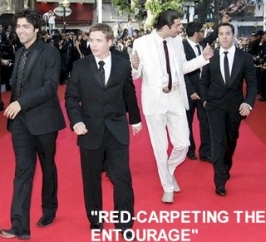
At the time, the controversial evacuation of rich Saudis prompted charges of special treatment and inadequate screening of passengers by the FBI.
The FBI, of course, denied it, but in uncharacteristically colorful language.
“I say baloney to any inference we red-carpeted any of this entourage," an FBI official wrote in a 2003 internal note.
“Red-carpeting the entourage” may be the least of it.
The McCain lobbying scandal has been called as “silly as a blonde joke,” and an “assault on working women,” although the nature of the ‘work’ being engaged in by the working women under assault was left unspecified.
But it may not be as silly as it appears on the surface.
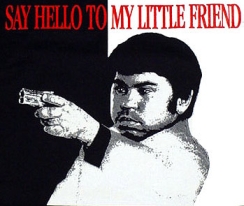 You can learn a lot about the players in political scandals these days by remembering the catch phrase from the old TV show Fantasy Island, which each week had an improbably-dressed midget in a tuxedo calling out:
You can learn a lot about the players in political scandals these days by remembering the catch phrase from the old TV show Fantasy Island, which each week had an improbably-dressed midget in a tuxedo calling out:
“De plane, boss! De plane!”
Lobbyist Vicki Iseman, McCain's very own “Campaign Suicide" Blonde, nestled cozily beside Big John McCain on a 727 tricked out to suit the garish tastes of Saudi Royal Princes.
A year later this same plane will become one of six flying Saudi evacuation flights which would be scrutinized by the 9/11 Commission.
The connection between the Saudi Royal Family and a company that owns “Worship Ministries” and Christian Network, Inc. is not immediately apparent.
Senator & Buxom Blonde Take Mile-High Sweet Ride
 But first, let’s hear some more about the sex.
But first, let’s hear some more about the sex.
The female Washington lobbyist alleged to have been Senator John McCain’s jet-setting paramour is described in some accounts a “bright, energetic woman who made her way from the farms and coal fields of rural Pennsylvania to the ruthless environment of Washington.”
Spun another way, Iseman is “blond, buxom, & three decades younger” than horny old goat McCain. (Her lobbying firm tried to take her bio off their website, but nothing stops the WayBack Machine. )
Most speculation has focused on the obvious…Did they or didn’t they?
Did the duo take a mile-high sweet ride?
Here we’ll admit to an editorial bias. We certainly hope so. It would clear up a pressing question about McCain's candidacy for President: "Is McCain too old to be President?"
Original here
Watch out, Bob Dole
Not. It’s a win-win for Big John...
Because even if the 71-year-old lawmaker didn’t sleep with an attractive blond 30 years his junior, he is being looked at with new respect by older male voters whose allegiance is key to Republican hopes in the fall.
Also, when Bob Dole “shuffles off this mortal coil,” Big John will be nicely positioned for a lucrative spokesperson contract touting Viagra.
Truth be told, maybe we’re just jaded, but we're not really feeling it for what we've heard so far. So on this one, we’ll take the high road, we think.
 A woman with a burning desire, and a man old enough to be her grandfather. Its not all that titillating.
A woman with a burning desire, and a man old enough to be her grandfather. Its not all that titillating.
Its... its icky.
McCain also leaves us feeling embarrassed for our entire unimaginative gender because of the unfortunate resemblance—about which neither woman can be pleased—between Vicki the “Campaign Suicide Blonde” and the Senator’s current wife Cindy.
This does not speak well for McCain’s ability to think “outside the box.”
Original here
Think "The Getaway" meets "Sheiks on a Plane."

Now let’s take a look at ‘da planes.’
In the worst possible way, they wanted to get out of Dodge.
The Saudi Royals and their entourage in Vegas were understandably anxious to get out of the U.S. in a hurry in the aftermath of the 9/11 attack.
What aroused suspicion was the 9/11 Commission Report’s unusually terse statement and non-committal language when discussing the provenance of the Saudi flight out of Vegas.
They never named the owner, as they did with the other planes involved. The 9/11 Commission's addendum on the Saudi flights names the owners of the other airplanes involved, but neglects to mention that Saudi Royals escaped on a plane belonging to a Christian broadcaster.
Saudi Princes Fly "Air Jesus"
They called it “Chartered Flight B 727-21, Tail Number N727PX.”
“On September 20, 2001, 18 members of the party of Saudi Prince Abdulmajeed Bin Abdulaziz departed from Las Vegas, Nevada, for Stamstead, England aboard a chartered B 727-21, tail number 727PX, destination Stamstead Airport (London) England,” read the Commission addendum on the Saudi flights.
“Before departure the aircraft was swept, perimeter security was provided, and all persons boarding were matched to previously provided passports and a manifest by agents of the USCS.”
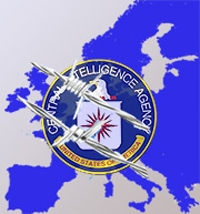 The 727 that ferried both John McCain and Saudi Royals actually belonged to Vicki’s boss, Lowell “Bud” Paxson, whose Paxson Communications owns a down-market Christian broadcaster called PAX-TV.
The 727 that ferried both John McCain and Saudi Royals actually belonged to Vicki’s boss, Lowell “Bud” Paxson, whose Paxson Communications owns a down-market Christian broadcaster called PAX-TV.
Paxson was Miss Vicki’s biggest client. Nothing wrong with that.
As it happens, “Air Jesus” was in good company.
Two others of the six flights scrutinized by the 9/11 Commission were flown by air contractors known to be involved in CIA renditions on planes whose flight logs recorded trips to Guantanamo Bay, where the CIA’s detention facility was doing brisk business.
Two of the six, in other words, were CIA planes.
Original here
Maybe that's what stole Ohio for Bush in 2004
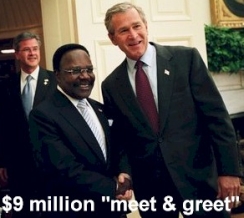
A third plane belonged to an unlikely player, the national carrier of the African nation of Gabon. Or rather from its President, a friend of Jack Abramoff's so close and personal that his checks usually had six zeros in them.
Abramoff was at that time still at liberty, not yet a felon (a convicted one, anyway), and probably still thought of the "Big House" as Aaron Spelling's mega-mansion in Beverly Hills.
Omar Bongo is President-for-Life (bien sur!) of Africa's beyond-corrupt Republic of Gabon. He seems an unlikely personage to pop up in an aviation-related story. But what he lacks in aviation credentials he more than makes up for with his close ties to Republican lobbyist Jack Abramoff.
Bongo paid Abramoff $9 million for the promise of an Oval Office meeting with President Bush. And in May 2004, he got a 30-minute meeting in the White House with George W. Bush.
A win-win situation for both sides, no doubt. The $9 million would have sure come in handy to help grease things during the brouhaha over the flawed Presidential election in Ohio.
Original here
"Guido, Rachid, Rachid, Guido"
All of the planes we've looked at so far that were used, along with McCain's lobbyist squeeze's 727, on Saudi evacuation flights. All had, and have, interesting associations. But only one of the planes is, well, you know... officially connected.
To the Mob. The owner is a very close personal friend of the biggest crime boss in New England.
The six planes scrutinized for flying Saudis out of the U.S. share heavy political connections at the top end of American political life, and have more in common than can be accounted for by chance.
Where does the plane McCain and his lady friend flew on fit in? What’s a religious broadcaster doing in such motley company?
Christian broadcasters wouldn't seem to have a lot in common, just as organizations, with the CIA, the Mob, and disgraced Republican lobbyist Jack Abramoff.
Original here
Registered lobbyist for Netherworld, Inc.
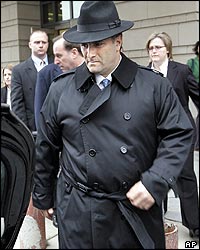 Was John McCain’s use of this particular plane pure happenstance? Did the Saudis charter PAX-TV’s 727 by mistake?
Was John McCain’s use of this particular plane pure happenstance? Did the Saudis charter PAX-TV’s 727 by mistake?
Answers could help clarify whether this is a sex scandal, a corruption scandal, or even a scandal at all.
There’s something slightly sinister about "Campaign Suicide" Blonde Vicki Iseman’s corporate client list. She and Tampa-based lobbying firm Alcalde & Fay service a roster of companies comprising a “Who’s Who” of a peculiarly American netherworld...
Gambling casinos and Saudi money mingle with covert operations of the CIA, felonious schemes of Republican lobbyists... even a television network responsible for the scurrilous Swift Boat documentary that sunk John Kerry’s chances for the Presidency in 2004...
They rep the brother of a Saudi billionaire wanted for securities fraud, cruise ship lines making billions a year but paying no American taxes…A broadcasting network, Sinclair, responsible for producing and airing the “documentary” that swift-boated John Kerry’s Presidential ambitions in the 2004 elections...
Were there hidden connections between the companies on the client list of comely blond lobbyist Vicki Iseman's client list?
Companies secretly allied in some non-SEC-approved way?
Original here
Mogul "found God in Vegas hotel room"

And a Christian network, PAX-TV (now ION) whose offerings stand out as having been exceptionally tawdry even in the notoriously heavily-mascaraed field of religious broadcasting.
Paxson Communications amassed more than 70 television stations in five years, the biggest collection in the nation, with access to about three-quarters of all US homes.
His religious ventures were always ambitious, if rarely in good taste…
He even started his own “mega-church” in Jupiter, Florida. The improbably named “Christ Church of the Palm Beaches” was first set to open on the site of the former Palm Beach Jai Alai fronton.
The best of both worlds: Pari-mutuel betting and Sunday services.
When that deal fell through, Paxson next eyed Burt Reynolds' defunct Carousel Jupiter Theatre, and while waiting for repairs to be completed, an informal bible study meeting called "Cappuccino and Christ," launched next door at the Jupiter Beach Resort.
And then there's that mental image of Lobbyist Vicki the “Campaign” Suicide Blonde nestled cozily beside Big John McCain on a 727 tricked out like a whorehouse to suit the garish tastes of Saudi Royal Princes.
Jesus would be proud.
Original here
“Hickory dickory dock, the Diceman joins the flock.”
 Its a heady mix, even before adding in PAX-TV’s roster of stars so faded they didn't even get calls to fill-in when someone gets sick on Hollywood Squares anymore. Many had documented substance-abuse problems where the ultimate outcome was always very much in doubt.
Its a heady mix, even before adding in PAX-TV’s roster of stars so faded they didn't even get calls to fill-in when someone gets sick on Hollywood Squares anymore. Many had documented substance-abuse problems where the ultimate outcome was always very much in doubt.
There were Stacy Keach and Anthony Michael ‘Detox’ Hall, “plumping for the Lord.” PAX-TV even took celebrity casting to new non-denominational lows, with a show about coming to Jesus through the joy of Jewish cooking.
Called “Chicken Soup for the Soul,” it starred Andrew 'Dice' Clay.
It is a remarkable web of connections…
The lobbyists behind repeated referendums pushing for legalized casinos in Florida, billionaire weapons merchant Adnan Khashoggi’s brother, Essam, owner of Earthshell (whose bright idea it was to manufacture biodegradable cheeseburger wrappers for McDonald’s)... even former lawmakers whose legislative "achievements" included slipping into law  provisions making possible today’s multi-billion dollar offshore gambling industry in Florida.
provisions making possible today’s multi-billion dollar offshore gambling industry in Florida.
Did we mention, by the way, that this casino industry is completely unregulated?
An almost all-cash business?
And once again we are back to Jack Abramoff.
Original here
What about the guy who wrote checks for the hit?
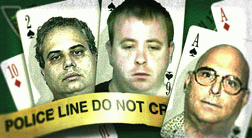
In several different ways, Paxson Communications and Jack Abramoff’s “people” have, shall we say, “close business ties.”
Currently winding out, the Abramoff Scandal will not have run its course until the completion of the upcoming trial of three New York Mafia Gambino Family members for the murder of casino ship line owner Gus Boulis.
 Paxson and Abramoff are connected though Gus Boulis.
Paxson and Abramoff are connected though Gus Boulis.
Gus Boulis owned a dozen casino gambling ships parked at ports around Florida. The casinos, to this day, are completely unregulated. No one know how much money they take in every day.
Of this figure, the daily take, which nobody knows, no one knows who gets what. A cash business with nobody looking over your shoulder...
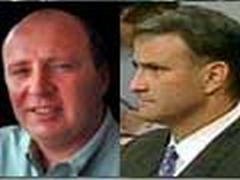 Jack Abramoff coveted Gus Boulis’ casino business in the worst possible way. So he "supposedly” duped an otherwise savvy Chicago hedge fund named Citadel Investment into lending him $32 million to purchase Boulis’ fleet of a dozen unlicensed offshore gambling vessels.
Jack Abramoff coveted Gus Boulis’ casino business in the worst possible way. So he "supposedly” duped an otherwise savvy Chicago hedge fund named Citadel Investment into lending him $32 million to purchase Boulis’ fleet of a dozen unlicensed offshore gambling vessels.
Dead men don't need 'walking around' money
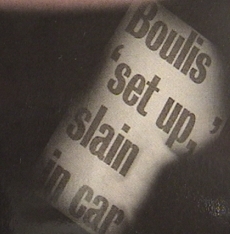
Then, in relatively short order, having been paid no more than a mere pittance of the agreed-upon sale price, Gus Boulis was dead.
When Paxson’s Pax-TV fell on hard times several years ago, and the firm was in danger of being declared bankrupt, the broadcaster was rescued by a timely investment from the same hedge fund in Chicago, Citadel Investment, that loaned Jack Abramoff $32 million to purchase a fleet of a dozen unlicensed offshore gambling boats owned by soon-to-be-murdered gambling mogul Gus Boulis.
Damn. Abramoff again.
The real question in the McCain scandal isn’t about whether McCain had sex with an attractive blonde female lobbyist, or whether he improperly intervened with letters to Federal Agencies on her client’s behalf.
Both are so commonplace as to barely qualify as news.
Chilling thought: Jack Abramoff might have been fronting planes for the CIA. That's certainly an awful thought, well-worth being hidden...
The prospect seems almost too awful to contemplate.
What would Jesus say?
1 in 100 U.S. Adults Behind Bars, New Study Says
For the first time in the nation’s history, more than one in 100 American adults is behind bars, according to a new report.
Nationwide, the prison population grew by 25,000 last year, bringing it to almost 1.6 million. Another 723,000 people are in local jails. The number of American adults is about 230 million, meaning that one in every 99.1 adults is behind bars.
Incarceration rates are even higher for some groups. One in 36 Hispanic adults is behind bars, based on Justice Department figures for 2006. One in 15 black adults is, too, as is one in nine black men between the ages of 20 and 34.
The report, from the Pew Center on the States, also found that only one in 355 white women between the ages of 35 and 39 are behind bars but that one in 100 black women are.
The report’s methodology differed from that used by the Justice Department, which calculates the incarceration rate by using the total population rather than the adult population as the denominator. Using the department’s methodology, about one in 130 Americans is behind bars.
Either way, said Susan Urahn, the center’s managing director, “we aren’t really getting the return in public safety from this level of incarceration.”
But Paul Cassell, a law professor at the University of Utah and a former federal judge, said the Pew report considered only half of the cost-benefit equation and overlooked the “very tangible benefits — lower crime rates.”
In the past 20 years, according the Federal Bureau of Investigation, violent crime rates fell by 25 percent, to 464 for every 100,000 people in 2007 from 612.5 in 1987.
“While we certainly want to be smart about who we put into prisons,” Professor Cassell said, “it would be a mistake to think that we can release any significant number of prisoners without increasing crime rates. One out of every 100 adults is behind bars because one out of every 100 adults has committed a serious criminal offense.”
Ms. Urahn said the nation cannot afford the incarceration rate documented in the report. “We tend to be a country in which incarceration is an easy response to crime,” she said. “Being tough on crime is an easy position to take, particularly if you have the money. And we did have the money in the ‘80s and ‘90s.”
Now, with fewer resources available, the report said, “prison costs are blowing a hole in state budgets.” On average, states spend almost 7 percent on their budgets on corrections, trailing only healthcare, education and transportation.
In 2007, according to the National Association of State Budgeting Officers, states spent $44 billion in tax dollars on corrections. That is up from $10.6 billion in 1987, a 127 increase once adjusted for inflation. With money from bonds and the federal government included, total state spending on corrections last year was $49 billion. By 2011, the report said, states are on track to spend an additional $25 billion.
It cost an average of $23,876 dollars to imprison someone in 2005, the most recent year for which data were available. But state spending varies widely, from $45,000 a year in Rhode Island to $13,000 in Louisiana.
The cost of medical care is growing by 10 percent annually, the report said, and will accelerate as the prison population ages.
About one in nine state government employees works in corrections, and some states are finding it hard to fill those jobs. California spent more than $500 million on overtime alone in 2006.
The number of prisoners in California dropped by 4,000 last year, making Texas’s prison system the nation’s largest, at about 172,000. But the Texas legislature last year approved broad changes to the corrections system there, including expansions of drug treatment programs and drug courts and revisions to parole practices.
“Our violent offenders, we lock them up for a very long time — rapists, murderers, child molestors,” said John Whitmire, a Democratic state senator from Houston and the chairman of the state senate’s criminal justice committee. “The problem was that we weren’t smart about nonviolent offenders. The legislature finally caught up with the public.”
He gave an example.
“We have 5,500 D.W.I offenders in prison,” he said, including people caught driving under the influence who had not been in an accident. “They’re in the general population. As serious as drinking and driving is, we should segregate them and give them treatment.”
The Pew report recommended diverting nonviolent offenders away from prison and using punishments short of reincarceration for minor or technical violations of probation or parole. It also urged states to consider earlier release of some prisoners.
Before the recent changes in Texas, Mr. Whitmire said, “we were recycling nonviolent offenders.”
FOR IMMEDIATE RELEASE
photos: Jacob Appelbaum, Milton Rand Kalman and Mademoiselle Rouxben
The Billboard Liberation Front today announced a major new advertising improvement campaign executed on behalf of clients AT&T and the National Security Agency. Focusing on billboards in the San Francisco area, this improvement action is designed to promote and celebrate the innovative collaboration of these two global communications giants.
“This campaign is an extraordinary rendition of a public-private partnership,” observed BLF spokesperson Blank DeCoverly. “These two titans of telecom have a long and intimate relationship, dating back to the age of the telegraph. In these dark days of Terrorism, that should be a comfort to every law-abiding citizen with nothing to hide.”
AT&T initially downplayed its heroic efforts in the War on Terror, preferring to serve in silence behind the scenes. “But then we realized we had a PR win on our hands,” noted AT&T V.P. of Homeland Security James Croppy. “Not only were we helping NSA cut through the cumbersome red tape of the FISA system, we were also helping our customers by handing over their e-mails and phone records to the government. Modern life is so hectic – who has time to cc the feds on every message? It’s a great example of how we anticipate our customers’ needs and act on them. And, it should be pointed out, we offered this service free of charge.”
Commenting on the action, and responding to questions about pending privacy litigation and the stalled Congressional effort to shield the telecoms from these lawsuits, NSA spokesperson [REDACTED] remarked: “[REDACTED] we [REDACTED] condone [REDACTED] warrantless [REDACTED], [REDACTED] SIGINT intercepts, [REDACTED] torture [REDACTED] information retrieval by [REDACTED] means necessary.”
“It’s a win-win-win situation,” noted the BLF’s DeCoverly. “NSA gets the data it needs to keep America safe, telecom customers get free services, and AT&T makes a fortune. That kind of cooperation between the public and private sectors should serve as a model to all of us, and a harbinger of things to come.”
Come see the improvement at 14th St. and Valencia St. in San Francisco
The BLF (www.billboardliberation.com) has been improving outdoor advertising since 1977. Prior campaigns have included work for Exxon, R.J. Reynolds, and Apple Computers.
AT&T (www.att.com) is America’s favorite telecommunications trust. Based in San Antonio, Texas, it has over 300,000 employees and annual revenues of $117 Billion.
NSA (www.nsa.gov) is the largest intelligence organization in the world. Headquartered at Fort Meade, Maryland, its budget, personnel, products, and services are all classified.
Blank DeCoverly
BLF Minister of Propaganda
Unlawfully Detained At Home Depot For Not Showing Receipt
 Reader Matt has launched the dreaded EECB (Executive Email Carpet Bomb) on Home Depot—attaching a copy of a formal complaint that he filed with the Metropolitan Police in Washington, D.C..
Reader Matt has launched the dreaded EECB (Executive Email Carpet Bomb) on Home Depot—attaching a copy of a formal complaint that he filed with the Metropolitan Police in Washington, D.C..
In addition to poor customer service and an inadequately maintained and stocked store, Matt says he was illegally detained by the Metropolitan Police and forced to return to the store to show his receipt to a Home Depot employee.
According to his police report, the officer stopped Matt without reasonable cause and forced him to comply with "store policy." Matt feels that this was a violation of his 4th amendment rights.
Why are the Washington D.C. police enforcing Home Depot's "store policies" as if they were laws? Nothing better to do?
Here's Matt's letter to Home Depot's CEO Frank "Li'l Frankie" Blake:
Dear Mr. Blake,Original hereSince purchasing my home in March 2007, I've spent nearly $10,000 on various projects around my home; most of that was spent at my local Home Depot in Washington, DC. Despite the poor inventory, poor customer service, long check out lines, disorganization of the store, rummaged-through/opened/broken/incomplete items sold, and many other problems with the store, I've shopped there because it's local and has a good-sized lumber/drywall supply. After a recent incident, however, I'll likely not return and instead will probably drive a few miles further to a Lowe's in Maryland or Virginia in the future.
Long story short, I refused to show my receipt to exit the store, and was detained illegally (albeit briefly) by a uniformed Washington, DC Metropolitan Police officer in the 5th District on February 21, 2008. I've submitted a formal complaint to the police department, which is attached. I refuse to be treated like a criminal and be held at your store illegally in the future. As you probably know, most retail shrinkage/loss occurs as a result of internal theft by employees, not customers, so the store "requiring" customers to display receipts at exits likely isn't doing much good anyway (not to mention that customers are not legally required to display receipts).
In addition to this incident, I've experienced the below within the past few months:
-Lack of knowledgeable sales staff
-Discourteous sales staff
-Inattentive sales staff
-Trouble receiving replacement parts missing from a ceiling fan kit; the local Home Depot associate actually opened up a new box for a different fan, gave me parts he assured would work, and sent me on my way. The parts didn't fit my fan at all, and now the local Home Depot has yet another opened and incomplete item; the Chinese manufacturer was more efficient and shipped the parts to me as a courtesy.
-Saw used for cutting/ripping plywood and other lumber has been out of service for some time (forcing me to go elsewhere)
-Initial refusal by a cashier to allow an exchange of a Commercial Electric brand item; she claimed that the item was not purchased at a Home Depot, even though this brand is sold exclusively by Home Depot (after wasting 30 minutes of my time, a manager overrode the decision)
-Inaccurate inventory numbers, resulting in perpetually out-of-stock items (e.g.: one time, the store's inventory system indicated to a sales rep that the store had hundreds of an item in stock, yet no associate could find the large, oddly-shaped item, forcing me to go to a competing store out-of-state, which has helpful staff and plenty of the item readily available)
-A store security guard grabbing my person and my purchased items and not allowing me to leave the store; my father had the receipt and already left the immediate area (Again, this type of action is unlawful; store employees or contractors have no legal right to touch/assault customers or prevent them from leaving, even if no receipt is shown. After purchasing the items, a customer's obligation to the store ends.)
-Common items out of stock (one more than one occasion, I couldn't find a CPVC 1/2" elbow; this is a very common part, and it's frustrating to have to rig several components together to complete a project)
-A 40-minute wait to even speak to someone about ordering a sheet of laminate countertop material (I recently built my own kitchen cabinets and counters); three other associates were present and available in the department, but claimed that the one busy associate was the single person in the store who could give me a rough guesstimate of price (I gave up and drove a few miles out-of-town to Lowe's, which had a handful of popular styles of laminate sheets in stock, unlike Home Depot).
When I first arrived to DC, I was happy to hear that there was a Home Depot in town, as I was familiar with the "You can do it, we can help" attitude portrayed in advertisements. My experiences (only some are list above) have proven, however, that the Home Depot is most certainly not in a position to help as advertised. In fact, I wish I would have spend the thousands of dollars at Lowe's or other stores. Even with a further distance to travel and possibly higher prices, I wouldn't have left the store stressed out or frustrated nearly every time.
Mr. Blake, I realize this is a long e-mail, but I hope you-- as Home Depot's CEO-- will consider what I've said and work to institute changes at the Home Depot in our nation's capital; until then, though, I'll likely find a store that's well-organized and staffed with persons who are helpful.
In addition, I read today that Home Depot recently posted its first-ever annual sales decline, with a 27% drop in the fourth quarter of 2007. With those losses, I'm surprised that Home Depot hasn't gotten back to basics like having good customer service, sensible policies, and treating customers as they should be treated.
Please feel free to contact me via e-mail or telephone at [redacted] should you have any questions.
Yours,
Matt
The most spied upon people in Europe
Germany's highest court has ruled that spying on personal computers violates privacy, but governments across Europe are under pressure to help their security services fight terrorism and organised crime.
Here, BBC reporters give a snapshot of the extent of surveillance across Europe.
Germans have an historic fear of state intrusion, dating back to the Stasi secret police in the East and the Nazi-era Gestapo. But the threat of terrorism has forced the German government to take stricter measures.
During the 1970s, the West German authorities tightened legislation after a series of attacks by the left-wing Red Army Faction. The German government went further following revelations about Mohammed Atta, the head of the Hamburg cell involved in the 9/11 attacks on New York.
![]()

![]()
The most controversial changes have come since 2006, when police found explosives in a pair of suitcases left on two passenger trains in Koblenz and Dortmund in western Germany.
The bombs did not go off and, after surveillance camera video was posted on the internet, arrests were made.
Chancellor Angela Merkel said the use of video surveillance was clearly important and rail operator Deutsche Bahn stepped up its use of closed circuit television (CCTV) cameras.
When a laptop was found apparently containing plans, sketches and maps, the authorities then considered how to monitor suspects' computers so that plots could be prevented at an earlier stage.
The Federal Criminal Police Office (BKA) already had the ability to monitor suspects' emails and the websites and chat rooms they visited.
They could also tap phones with the consent of a judge.
Now they wanted to send emails that would infect a recipient's computer with spy software and relay information to police computers.
The threat was compounded by the discovery of 12 vats of hydrogen peroxide in September 2007 and an alleged plot to bomb US civil and military targets.
Three hundred police had been involved in a nine-month surveillance operation but had not been able to access the suspects' computers.
The Constitutional Court has now decided that the practice of cyber spying violates the right to privacy but would be acceptable in exceptional cases, under the auspices of a judge.
Faced with warnings from Germany's privacy commissioner of ever more sweeping surveillance - and protesters' T-shirts bearing the slogan "Stasi 2.0" - the government will have to tread carefully.
The police believe they will need to use spy software in perhaps 10 cases a year.
There is a big-budget sci-fi thriller running on BBC TV at the moment called The Last Enemy.
The hero is advising ministers on plans for a crime-fighting database to link all databases. And, unwittingly, he becomes a victim of the computer's all-seeing eyes.
So is it silly drama or the shape of things to come?
Privacy campaigners say the UK has some of the world's leading surveillance systems - and they argue there is now a real failure of sufficient oversight.
![]()

![]()
Take the millions of CCTV cameras, for example. They were rolled out to deter city centre crime.
But thanks to the internet and new software that can read number plates, text and, in certain circumstances, isolate specific human behaviour, their importance is increasing ten-fold.
The question in the UK is what would happen if you took camera data and married it to other sources, such as information on the location of mobile phones, swipe cards for urban transport and static databases about you, your family and life history. That would be a pretty effective surveillance system, say critics.
Ministers say this is completely fanciful - for a start there are no plans for a supercomputer to gather this information.
Secondly they argue two important laws govern the use of personal information and how the security services can use surveillance technology.
But the reality is they are now struggling politically to make reassurances stick.
The two main opposition parties oppose plans for full biometric identity cards on grounds of cost, oversight and, increasingly, fears of incompetence. The cards are almost certain to become a big issue at the next general election.
A string of controversies have buffeted ministers including the loss of a laptop containing information on armed services personnel and the disappearance of CDs holding family records. There has also been a row over the bugging of an MP.
While none of these rows seamlessly fit together, the jigsaw pieces are enough to make some people nervous.
So while the police-led DNA database - the largest in the world - has clear crime-fighting successes under its belt, no political party will back the calls of one highly respected judge to place everyone on it.
The Roman satirist Juvenal famously asked "Who watches the watchmen?" and that question is very much alive in British politics today.
When you remember that the word "Liberty" is one of just three words enshrined in the French Republic's motto, you can guess that on the whole, the French are not big fans of surveillance equipment.
Too bad then that last year, the French Interior Minister, Michele Alliot-Marie, announced that the number of CCTV cameras in France would triple by 2009 in a bid to crack down on street crime and to fight terrorism.
Official estimates suggest there are already about 340,000 authorised surveillance cameras in France and this new move would see the number of cameras on Paris's public transport network hit 6,500 in the next two years - compared with a projected 9,000 on the London Underground in the same period.
Plans to deploy 4ft-long spy drones across French skies in an attempt to tackle the country's growing problem of gang violence were also unveiled.
The drones, with day-night vision, will be used to track suspects and should begin full operational testing this year. The plan has annoyed many local officials who doubt spy cameras are the answer - they would rather see neighbourhood police officers brought back.
![]()
![]() The children who have this device will think of their parents as Big Brother - I think that scares me
The children who have this device will think of their parents as Big Brother - I think that scares me ![]()
Psychologist
Surveillance cameras are not just kept for the streets. Last year a company which manufactures GPS systems for cars launched Kiditel, a child-tracking device.
The games console-sized device slips into a child's pocket and allows parents to keep track of their child's movements via satellite images sent to their computers.
Many parents welcomed a product they believed would help their children keep safe, but psychologists like Jean Claude Guillemard were not so welcoming:
"The children who have this device will think of their parents as Big Brother" he said. "I think that scares me. I think it's dangerous for their mental health."
Similarly a French childminder caused a row last year when she became the first nanny to install an internet webcam in her creche so that parents could still look in on their children - and see that she was taking good care of them - even though they were at work.
The parents loved it, but local authorities and the National Federation of Maternal Assistants denounced the idea as undermining the relationship of trust between the parents and the child minder.
The eye in the sky may be keeping an ever closer watch on France - but the French are determined to keep their liberty.
Italians are among the most spied upon people in the world. That's the conclusion of the authoritative German scientific think-tank, the Max Planck Institute, which reports that Italy leads the world with 76 intercepts per 100,000 people each year.
Although the Italian constitution guarantees privacy of information, and a national data protection authority was set up in 2003 with a communications ombudsman at its head, wiretapping and electronic eavesdropping are widely used not only by the secret services, but also by the judiciary, particularly in the fight against organised crime.

Prosecutors routinely order wiretaps as a result of police investigations, and the cost to the Italian state has become a heavy burden on the taxpayer.
Wiretaps are carried out with the help of the now privatised Italian Telecom, which has been frequently criticised in the media for working hand in glove with the secret services.
A former director of security at Telecom, Giuliano Tavaroli, who had close links with the secret services, was sent to prison together with his friend Marco Mancini, a former anti-terrorism chief, as a result of a wiretapping scandal.
Several recent high profile political scandals have revealed the extent to which the private conversations of politicians and public figures are being taped.
Although the bugging of MPs' phones is forbidden without the specific permission of parliament, prosecutors and judges routinely leak to journalists details of compromising conversations.
The former governor of the Bank of Italy, Antonio Fazio, was forced to resign as a result of a scandal which came to light in this way.
The outgoing government of Romano Prodi announced last year that it was going to introduce a law making it an offence punishable by up to three years imprisonment for journalists to publish information obtained through judicially authorised wiretapping leaks. But no such law was ever passed.
In the run-up to the 2004 Athens Olympics, I met a man who was furious about the appearance of 350 cameras in the capital as part of a $1.5bn security programme to protect athletes and spectators.
"If I choose to have an affair with a woman who is not my wife, that is my fundamental human right, and I should be protected from being caught on camera," he said.

The man was walking in the suburb of Nikaia, where the local left-wing mayor, who disapproved of surveillance, had ordered workmen to daub black paint over the lenses.
That cameo encapsulates the desire of most Greeks to resist state attempts to spy on them and helps explain why Greece leads the European Union and the rest of the world in privacy protection for its citizens.
The other important contributory factor is the strength and moral independence of the nation's Data Protection Authority, which is resolute in its determination to uphold the following principles enshrined in the Greek constitution:
The authority has real teeth. In December 2006 it fined mobile phone company Vodafone 76m euros for bugging more than 100 top Greek officials, including Prime Minister Costas Karamanlis, around the time of the Olympics.
Vodafone's network planning manager in Greece, Costas Tsalikides, was found hanged not long after he informed his superiors he had discovered that spying software had been secretly installed in the company's system.
Mr Tsalikides family has always suspected he was murdered.
| Panos Garganos Greek protester |
Since January 18, 2008, the case has been officially closed. Vodafone Greece will appeal against the fine and says it has co-operated fully with all relevant authorities since the beginning of the case.
The Data Protection Authority has also frustrated the efforts of the Conservative government to extract some value from the Olympic security system.
When a left-wing group called Revolutionary Struggle fired a rocket into the office of the US ambassador in Athens, there was no video record because the security cameras were switched off.
The authority refused to allow the cameras to be used for anything other than traffic control.
In November 2007, a state prosecutor told the police that they would be allowed to use footage from the surveillance system to prosecute demonstrators who turned violent.
The new rules were first applied during the annual 17 November march to commemorate the dozens of students killed in 1973 when tanks of the right wing colonels' junta crushed an uprising at Athens Polytechnic.
"So many years after the dictatorship, Greece is very sensitive in the area of freedoms," said Panos Garganos, who was marching for the 33rd year in succession.
The use of the cameras to monitor the demonstration led to the resignation of the head of the Data Protection Authority.
Despite the fact that Greece has such strong constitutional protection against state-sponsored spying, some of my contacts refuse to have sensitive conversations on either land lines or mobile phones, because they assume that someone is listening.
In keeping with other European countries, Denmark has introduced anti-terrorist legislation that has provided the country's domestic security service PET with a raft of monitoring tools with which to carry out its counter-terrorism activities.
With the discovery over the past five years of terrorist cells, and particularly groups using Denmark as preparatory ground for activities elsewhere in Europe, Danish parliamentarians have been relatively unanimous in adopting counter-terrorism measures, with the broad support of the general public.
These have included the availability to the domestic security service of quite extensive monitoring measures, particularly in the areas of communication interception, data retention and the ability to monitor and geographically locate mobile and other telephone conversations.
 Safeguards on CCTV monitoring in Denmark are strict |
While previous legislation required the security service to substantiate and obtain a court order for each telephone number it wished to monitor, the new law provides for application for a court order to monitor a person's full communication activities - telephones and cyber-communication - but only in connection with cases falling under counter-terrorism legislation.
CCTV monitoring, while extensive in other parts of Europe, is not widespread in Denmark, although there are currently plans, and a public demand, to introduce monitoring in some crime-prone urban areas following several murders and disturbances in defined areas at night.
However, safeguards against general CCTV monitoring are strict, preventing the installation of CCTV cameras in public areas that would allow the identification of individuals or groups.
A Copenhagen kindergarten that recently suggested it would like to install CCTV monitoring around its premises gave up the idea following a public outcry.
Similarly, workplace monitoring is under strict control, preventing camera surveillance of employees, although the installation of CCTV in public areas of shops in particular is permitted.







